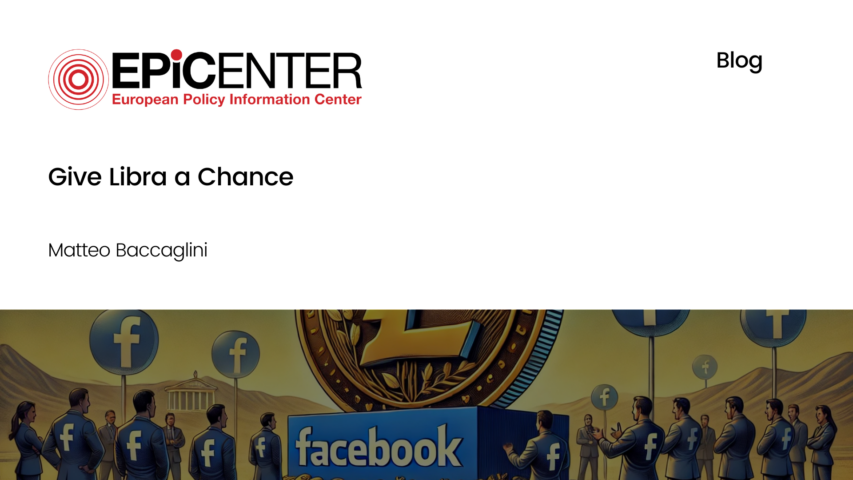Give Libra a Chance

Give Libra a Chance
Matteo Baccaglini // 28 August 2019
In July 2019, G7 finance ministers and central bank governors met for a two-day conference in Chantilly, in Paris’ north. Under consideration was Libra, a newly-proposed digital currency to be managed by Facebook.
Fearful that Libra could supplant sovereign currencies and channel money for illicit purposes, France, Germany and Italy expressed opposition to the project, joining consensus in the UK and USA. A worried Europe is quickly closing its doors on the bold project.
Regulators shouldn’t be so quick to do so. Much of their concern is misinformed or based on misconceptions on how Libra will work; and it ignores the opportunities that the digital currency could unlock for the world’s poorest.
Around the globe, 1.7 billion adults have no banking access. Virtually all of them live in the developing world. In such places, cash-based crime is pervasive and saving for investments and emergencies is difficult. Sending money over long distances is expensive: the unbanked must travel the distance in person, pay expensive cash couriers or rely on untrustworthy bus drivers. Financial exclusion keeps households in poverty, makes them vulnerable to emergencies, and hampers long-term investment.
So enter mobile money. At selected shops, the unbanked can exchange cash for money on a secure digital wallet. From that digital wallet, paying bills and sending money become as simple as sending a text message. Where banks have been painfully slow to reach the masses, mobile money has got there first.
There are already 866 million mobile money accounts, transacting $1.3bn daily. In Kenya, mobile money has lifted 194,000 Kenyan households, or 2% nationally, out of poverty, especially benefitting women.
Facebook has now set its eyes on the market. With 2.4 billion active users, it has a unique advantage in international transactions over established national mobile money titans like Kenya’s M-Pesa and India’s Paytm. Migrants sending money home lose $25 billion annually in remittance fees; their payments are among those that Facebook will aim to capture.
Where the project will depart from conventional mobile money is that it will operate its own digital currency, rendering digital savings safer from hackers targeting conventional mobile money. To oversee the currency, called Libra, Facebook has cofounded the Libra Association alongside twenty-seven other partners.
So what about European regulators’ concerns for Libra’s power and potential illicit uses?
For a start, Libra won’t replace sovereign currencies – or be anywhere near as powerful as supposed. Libra will be tied to a basket of currencies, so it’s not in anyone’s interest for Libra to replace sovereign currencies: a run on those currencies would also devalue Libra.
Besides, chances are that most people – except the unbanked – will keep only a small amount of money in their Libra wallet, using it for occasional transactions rather than as their main payment method. Taxes will still be denominated in sovereign currencies, and WhatsApp and Messenger are designed for use by individuals, not firms. While Libra could be incorporated into the services of its Association, it’s difficult to see why giants like Amazon would adopt Libra and so line the wallets of their rivals in the Libra Association.
It therefore seems unlikely that Libra will become an everyday currency – except, of course, where it performs better than the sovereign currency. In those cases, Libra could protect citizens in economies beleaguered by high inflation and exchange rate volatility, offering them an alternative to unruly central banks.
There is reason to hope that Libra will be sufficiently stable for this. Any interest incurred from Libra will reimburse its founding members, each of which have paid at least $10m into Libra’s reserves. Therefore, any increase in Libra’s value will merely reflect changes in the values of the currencies by which it is backed – so to investors, Libra will be just another uninteresting index tracker fund, deterring the speculative instability that has plagued Bitcoin.
As former Director of EPICENTER Diego Zuluaga explains, the design of Libra’s reserves means that the currency is unlikely to pose a new systemic risk to the world’s financial system.
Insofar as regulators’ second worry – illicit use – is concerned, Facebook will comply with regulations preventing banks from financing proscribed activities and individuals, though this will be to the detriment of law-abiding citizens who are unbanked merely because they cannot meet such requirements. Libra’s pseudonymous blockchain data will also be analysable to law enforcement agencies. And as a virtual currency, Libra will have to subscribe to 5MLD, the directive which brought virtual currency exchanges into the EU’s anti-money laundering legislation.
So rather than hastily shut its doors on the project, Europe should welcome the potential that Libra has to offer. Libra could greatly help the world’s unbanked, giving them an easy means of payment and a safe storage of money in a secure currency. With over €30bn sent in personal transfers beyond European borders every year, Libra could help migrants to Europe send more of their income to their families at home, rather than the pockets of couriers and transfer unions.
There may still be some regulatory fears that deserve Europe’s attention – especially whether and how Facebook will use transaction data from Libra. But for all it has to offer, Libra deserves a fair hearing.
EPICENTER publications and contributions from our member think tanks are designed to promote the discussion of economic issues and the role of markets in solving economic and social problems. As with all EPICENTER publications, the views expressed here are those of the author and not EPICENTER or its member think tanks (which have no corporate view).



